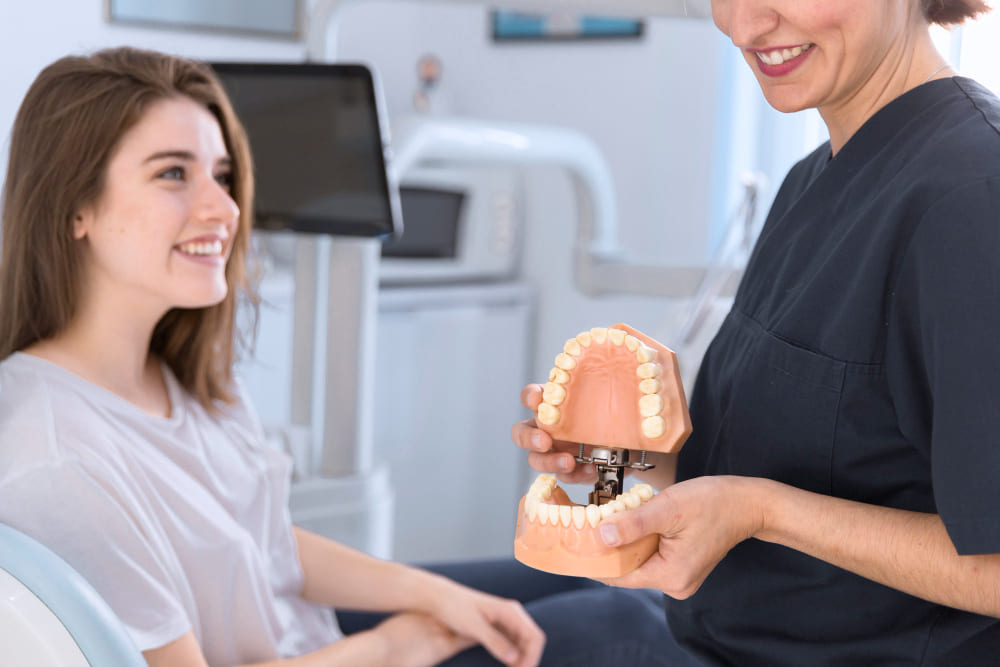

If your gums are bleeding, it’s crucial to address the issue promptly. Generally, this symptom signals the presence of gum disease. However, bleeding gums can also result from brushing your teeth too vigorously or from improperly fitting dentures.
To ensure proper care, consult your dentist, who can examine and treat these warning signs. Getting your gums assessed promptly is essential to prevent the condition from deteriorating into periodontitis.
You will be interested on: Dental Clinic in Al Ain Road
If you neglect proper dental care, you might start experiencing bleeding lips, often accompanied by swelling, a condition known as gingivitis. Failure to address gingivitis promptly can lead to the development of periodontitis, causing increased gum sensitivity and bleeding.
Persistent plaque buildup along the gum line can result from irregular dental care and infrequent dental check-ups. This accumulation can contribute to gingivitis, as it can harden into tartar, exacerbating bleeding issues. To minimize these concerns, adopt a daily routine of brushing your teeth twice a day with fluoride or anti-gingivitis toothpaste and a soft toothbrush. Avoid rinsing your mouth immediately after brushing to retain the benefits of fluoride. Regular flossing can further prevent the buildup of plaque, bacteria, and food particles in your mouth.
It’s worth noting that if you’re new to flossing, your gums may bleed initially. Additionally, individuals with gingivitis may experience symptoms such as swollen gums, mouth and gum pain and gum recession. Other indications include bad breath, an unpleasant taste, and changes in your bite due to misaligned teeth.
Keep reading: Dental Clinic in The Palm Jumeirah
If you suffer from dry lips, there are mouthwashes designed to alleviate this issue. If you are taking medications like antihistamines or decongestants, it’s advisable to consult your doctor, as they may recommend alternative treatments.
As gingivitis progresses into periodontitis, it can result in a severe infection affecting the gums, jawbone, and the surrounding oral tissues. This infection has the potential to loosen teeth and ultimately lead to tooth loss. Additionally, bleeding gums can be attributed to insufficient intake of certain vitamins, particularly vitamin C and vitamin K. To address this, it is advisable to consult with your doctor regarding your vitamin levels. If they determine that your intake is inadequate, you may consider adjusting your diet and incorporating more of the following foods into your daily consumption, along with increasing your water intake:
You will be interested on: Dental Clinic in Al Baraha
Besides neglecting oral hygiene and vitamin deficiencies, ill-fitting dentures can also contribute to gum bleeding. If you’re experiencing this issue with your dentures or other dental implants, it’s advisable to engage in a discussion with your dentist. They can consider crafting new molds and providing you with better-fitting dentures.
During pregnancy, hormonal fluctuations can render gums more sensitive, potentially leading to bleeding. It’s important to note that bleeding gums can escalate into more serious medical conditions like hemophilia and leukemia, especially if you are taking blood thinners such as paracetamol and ibuprofen. Additionally, elevated blood sugar levels can impede wound healing, which can serve as an indicator for both type 1 and type 2 diabetes.
Keep reading: Dental Clinic in Al Jaddaf
If you notice bleeding gums, it’s essential to schedule an appointment with your doctor. This will enable them to diagnose the underlying issue and determine whether it’s indicative of gum disease. They might recommend the use of an antibacterial mouthwash to reduce plaque accumulation along the gum line and to prevent gum disease. Additionally, a saltwater solution can be effective in alleviating swollen and sensitive gums that bleed easily.
Also, the following treatment is suggested:
To prevent or alleviate bleeding gums, adopting a healthy lifestyle is paramount. Avoiding excessive smoking and alcohol consumption is essential. Maintaining dental health involves incorporating a well-rounded diet that includes whole grains, fruits, vegetables, lean proteins, dairy, and fiber. Chewing gum can also contribute positively. Consider adding fluoride-rich foods to your diet, as they promote dental well-being. Items such as black tea, seafood, wine, coffee, raisins, and powdered grains can be beneficial in addressing bleeding gums.
Conversely, consuming sugary drinks and starchy, carbohydrate-rich foods can exacerbate gum bleeding, underscoring the importance of frequent water intake. Regular checkups with your doctor, ideally recommended at least twice a year, play a pivotal role in preserving gum health and preventing bleeding issues. Additionally, dentists possess the expertise to detect early signs of gum disease and provide guidance on prevention and treatment.
You will be interested on: Dental Clinic in Palm Jebel Ali
Visit your dentist to find out what’s causing your bleeding gums and how to stop them. Your dentist will also help you find the right treatment for you.
If you have any of the problems listed above, we will probably want to see you more often. Once we’re happy with the results, we’ll let you know if we want to see you every six months or once a year. We can also help you if you have a dental problem.
If you want to know more about our dental treatments or have questions about how to stop your gums from bleeding, we would be happy to help.